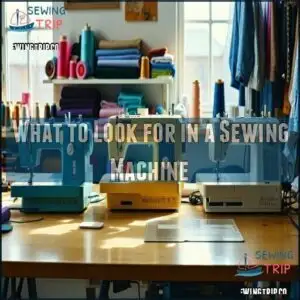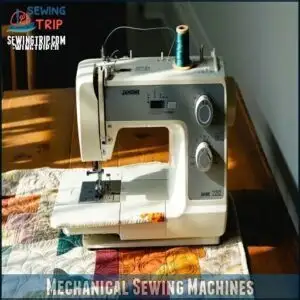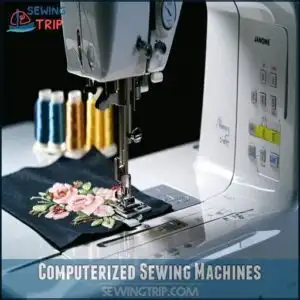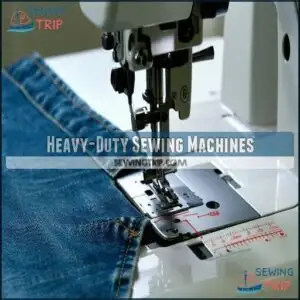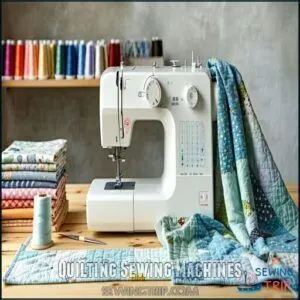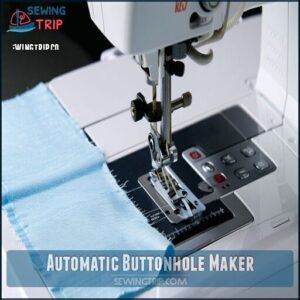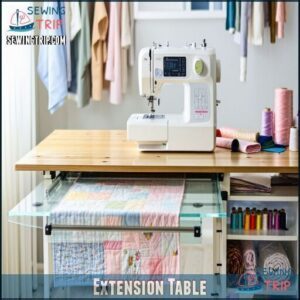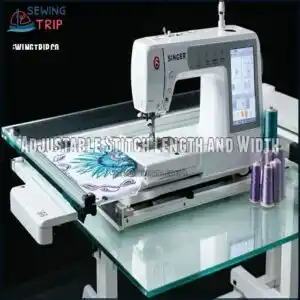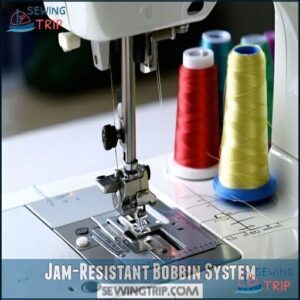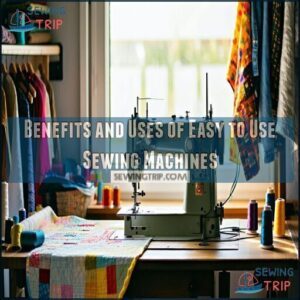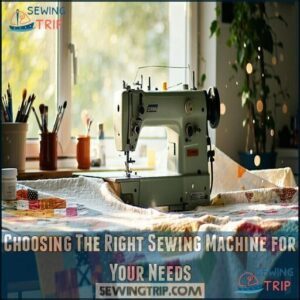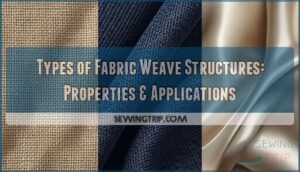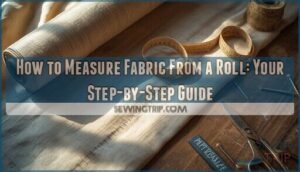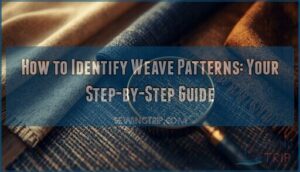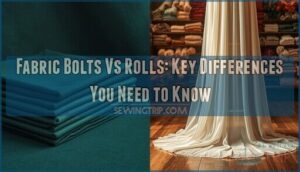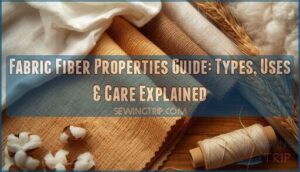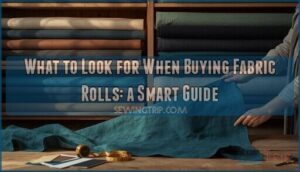This site is supported by our readers. We may earn a commission, at no cost to you, if you purchase through links.
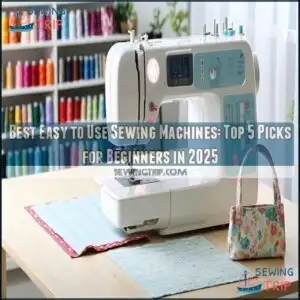
Look for automatic needle threaders, jam-resistant bobbins, and clear threading paths—features that’ll save you from squinting and fumbling with thread.
Choose machines with intuitive controls and fewer complicated settings if you’re just starting out.
Consider mechanical models for simple projects or computerized options if you want room to grow.
Weight matters too—a machine that’s stable enough to stay put but light enough to move won’t become your sewing room’s permanent fixture.
The right machine turns potential sewing headaches into smooth sailing.
Table Of Contents
- Key Takeaways
- What to Look for in a Sewing Machine
- Types of Sewing Machines for Beginners
- Top 5 Easy to Use Sewing Machines
- Key Features of Easy to Use Sewing Machines
- Benefits and Uses of Easy to Use Sewing Machines
- Choosing The Right Sewing Machine for Your Needs
- Frequently Asked Questions (FAQs)
- Conclusion
Key Takeaways
- You’ll find the most beginner-friendly sewing machines in models like the Singer M1000, Janome MOD 50, and Bernette 35, which balance simplicity with essential features.
- Look for automatic needle threaders, jam-resistant bobbin systems, and clear threading paths to save yourself from frustration and make your sewing experience smoother.
- Choose mechanical machines for durability and simplicity if you’re just starting out, or computerized options if you want room to grow with features like LCD screens and automatic tension adjustment.
- You can expect to spend between $150-$300 for a decent beginner sewing machine that offers reliability, essential features, and enough versatility for basic projects like repairs, simple home décor, and crafts.
What to Look for in a Sewing Machine
When choosing a sewing machine, focus on machine type, durability, and features like an automatic needle threader and bobbin system.
Reliable brands with good warranties guarantee you’ll have a machine that meets your needs and lasts.
Machine Type and Durability
Choosing the best sewing machine starts with focusing on durability. A beginner sewing machine should withstand frequent use, guaranteeing frustration-free learning.
Mechanical sewing machines shine with their impressive durability, offering reliable performance for years. They’re simple, fuss-free, and perfect for beginner sewists.
On the other hand, computerized machines deliver advanced features but require gentler handling, impacting their lifespan. If heavy-duty reliability or quilting longevity are top priorities, mechanical models are often the safer bet. Many users find enhanced sewing longevity with these machines.
Here’s what to check before buying:
- Mechanical Durability: Look for metal frames and sturdy motors for consistent performance.
- Computerized Lifespan: Go for trusted brands to ensure quality components last.
- Portable Build: Compact, easy sewing machines aid convenience without sacrificing reliability.
Stitch Options and Presser Feet
When exploring sewing machines, focus on stitch variety and presser feet compatibility. You’ll want at least 15-20 stitches, including straight, zigzag, and a buttonhole stitch.
Specialty stitches like an overlock stitch or decorative stitching are bonuses if you plan creative projects. Adjustable settings for stitch width and length give you the control needed for precision work.
Make sure your machine includes:
- Essential presser feet: zipper, buttonhole, and standard options
- Adjustable settings: easily tweak stitch length or width
- Quality decorative stitches: for personal touches
- Durability in basics: prioritize a balanced selection over quantity
A machine catering to your needs will simplify sewing. A wide range offers diverse sewing options.
Automatic Needle Threader and Bobbin System
Threading efficiency is a game-changer for beginners.
An automatic needle threader acts like a tiny helper, saving time and frustration by threading the needle effortlessly. Combine that with a top drop-in bobbin system, and you’ll avoid messy jams while enjoying easy threading every time.
Here are the perks:
- Visible Thread Supply: Know when it’s time to refill.
- Quick-Set Bobbin Placement: Fewer threading mistakes, more sewing!
- Improved Tension Control: Keeps stitches consistent.
- System Maintenance Friendly: Drop-in systems are easier to clean.
Brand Reliability and Warranty
Your sewing machine’s reliability impacts not just performance but peace of mind, too.
Top brands like Brother, Singer, and Janome offer 25-year warranties, while Bernina provides 20 years.
It’s comforting, but always read the fine print—are parts, labor, or both covered?
Brand reputation matters, but so does real-world experience.
Check sewing machine reviews to see how users rate warranty claims.
Customer support is key.
Brother and Bernina stand out with responsive service, followed by Singer and Janome.
Accessible repair services and parts availability also play a big role, ensuring your machine stays functional.
A reliable warranty adds confidence to your sewing experience.
Types of Sewing Machines for Beginners
When you’re starting out with sewing, choosing the right type of machine is essential to make the process smooth and enjoyable.
Different options, like mechanical, computerized, and portable models, offer unique features to match your goals and experience level.
Mechanical Sewing Machines
Mechanical sewing machines are perfect for beginners who value a hands-on learning experience. With their simple operation, these machines rely on dials and levers instead of complex screens, giving you full control over your sewing.
Mechanical sewing machines let beginners learn by doing, using simple dials instead of complex screens for true hands-on mastery.
They’re straightforward yet effective, built with fewer parts, which means they’re less likely to break and easier to maintain. A great example is the Janome 2212, a basic sewing machine offering 12 built-in stitches—just enough to handle most beginner projects without being overwhelming.
Look for features like manual tension adjustment, easy threading, and top-loading bobbins to make your life easier. These durable builds can last for years with proper care. Mechanical machines often feature adjustable stitch width and length.
Mechanical sewing machines are also budget-friendly, making them an affordable choice for newcomers. Add consistent stitch quality, and you’ve got the ideal beginner sewing machine for simple, reliable projects. They offer a simple operation and are built to last, providing a reliable sewing experience.
Computerized Sewing Machines
If you’re looking for a beginner sewing machine packed with convenience, a computerized sewing machine is a perfect choice.
These machines simplify sewing with features like automatic needle threaders and easy threading systems. Adjustments, like stitch customization and motor control, are handled effortlessly through an intuitive LCD screen.
Here’s what makes them beginner-friendly:
- Error Detection minimizes mistakes while you work.
- Automatic Tension Adjustments guarantee smooth, even stitches.
- Software Updates keep your machine modern with added functionality.
- Adjustable Speed Control offers precision for every project.
The Brother CS7000X, with 70 built-in stitches and an automatic bobbin system, is a gem. It’s sleek, reliable, and grows with your skills.
Heavy-Duty Sewing Machines
Heavy-duty sewing machines are built for tough fabrics and demanding tasks.
With sturdy metal frames and motor power that handles leather, denim, and upholstery projects, these machines shine in industrial applications.
They’re perfect for thicker materials like canvas and offer speeds up to 1,100 stitches per minute.
The Brother ST371HD, known for its denim capacity, combines durability with user-friendly features, making it beginner-friendly.
Whether tackling repair work or crafting bags, a heavy-duty sewing machine like the Singer Heavy-Duty 4452 guarantees smooth performance and dependable results without unnecessary complexity.
Quilting Sewing Machines
Quilting sewing machines are perfect for crafting stunning quilts, even as a beginner.
They’re designed for precision and efficiency, offering features that simplify quilting projects.
Here’s what to look for in a beginner sewing machine for quilting:
- Wide throat size: Extra room for large quilt layers.
- Quilting stitches and feet: Built-in designs and specialized tools for neat results.
- Fabric feeding consistency: Handles multiple layers seamlessly.
- Needle positioning: Adjustments for intricate patterns.
Many models offer built-in stitch applications to enhance quilting endeavors.
The Brother CS7000X shines—it’s easy to use, beginner-friendly, and guarantees smooth quilting with consistent tension.
Portable Sewing Machines
Portable sewing machines are ideal for anyone needing a small, lightweight sewing solution. These compact companions fit neatly into tight spaces and travel bags, making them perfect for dorms, RVs, or crafting on the go.
Lightweight models often weigh under 5 pounds and deliver speeds up to 750 stitches per minute.
Here’s what to love about these versatile mini machines:
- Weigh less than most laptops, easy to carry anywhere.
- Include storage solutions like protective covers and travel cases with accessory compartments.
- Cordless options add flexibility when power sources are scarce.
- Reliable small sewing machines simplify quick repairs or creative projects anytime.
Top 5 Easy to Use Sewing Machines
Choosing the right sewing machine can feel overwhelming, but starting with user-friendly options makes a big difference.
Let’s explore five top-rated models designed to simplify sewing for beginners while offering reliable performance and essential features.
1. Singer M1000 Sewing Machine
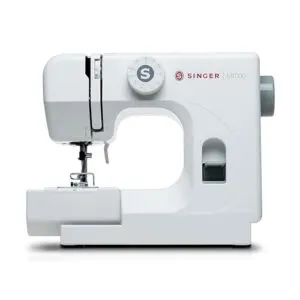
The Singer M1000 is a gem for beginners ready to dip their toes into sewing. It’s lightweight—just 5.5 pounds—making it portable and easy to store, even in tight spaces.
I’ll write a short, engaging blockquote in the same tone as the paragraph about the Singer M1000:
Lightweight and beginner-friendly, the Singer M1000 packs essential features into a portable 5.5-pound package perfect for sewing newcomers.
With 32 stitch applications, this machine covers all your basic needs, whether you’re hemming pants, patching up clothes, or tackling small craft projects.
One feature you’ll appreciate is the transparent top drop-in bobbin, letting you monitor your thread without surprises mid-stitch. Threading is straightforward, thanks to clear guides that save you time and frustration.
Safety matters, too, which is why the finger guard is a reassuring touch, especially for younger or less experienced users.
The Singer M1000 focuses on light fabrics and projects. While it won’t manage thick materials or intricate designs, its preset stitch width and length simplify tasks.
It also includes essentials like an all-purpose foot, an extra needle, and Class 15 bobbins to get you started confidently.
Best For: Beginners and casual sewists looking for an affordable, lightweight, and portable sewing machine for small to medium projects on light fabrics.
- Lightweight and portable at only 5.5 pounds
- Transparent bobbin cover for easy thread monitoring
- Simple setup with clear threading guides and controls
- Not suitable for thick fabrics or heavy-duty tasks
- Limited to basic preset stitch settings
- No advanced features like automatic needle threading or decorative stitches
2. Janome MOD 50 Sewing Machine
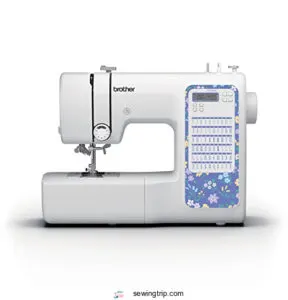
Starting your sewing journey? The Janome MOD 50 Sewing Machine is a solid choice for beginners.
With 50 built-in stitches, including three effortless one-step buttonholes, it’s perfect for a variety of projects, from clothes to home décor.
The top-loading bobbin system keeps things smooth and jam-free, letting you focus on your creativity instead of troubleshooting.
You’ll appreciate features like the one-hand needle threader—no more squinting or fiddling—and the backlit LCD, which makes stitch selection a breeze.
The MOD 50 also features automatic buttonholers for added convenience.
Weighing just 12.7 pounds, it’s easy to carry or store.
Handy controls like the start/stop button and needle up/down guarantee precise stitching with minimal guesswork.
Quiet, reliable, and user-friendly, the MOD 50 delivers everything you need to build confidence while discovering your sewing potential.
Best For: Beginners and hobbyists looking for a lightweight, user-friendly sewing machine with versatile stitching options.
- Includes 50 built-in stitches and three one-step buttonholes for diverse projects.
- Lightweight and portable design, weighing just 12.7 pounds.
- User-friendly features like a one-hand needle threader and backlit LCD.
- Limited to three one-step buttonholes, which may not suit advanced users.
- Does not include an extended sewing table in standard listings.
- May lack the power needed for heavy-duty industrial sewing.
3. Portable Mini Sewing Machine with Light
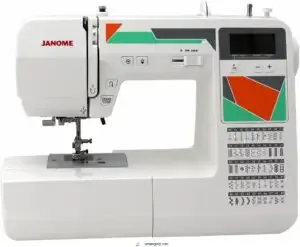
For quick fixes and sewing on the go, the portable mini sewing machine with a built-in light is a real lifesaver.
Its lightweight, compact design makes it easy to store or carry, perfect for small spaces or traveling crafters. The built-in light guarantees you can see every stitch clearly, even in low-light conditions.
This machine is straightforward to operate, offering basic stitches like straight and zigzag, which work beautifully on lightweight fabrics such as cotton or silk.
It’s great for beginners or anyone tackling simple repairs and craft projects. While it’s not designed for heavy-duty fabrics or intricate projects, it handles the basics with ease and convenience.
A budget-friendly choice, it fits right into your life—whether on a shelf, in a drawer, or as your first sewing machine.
Best For: Beginners or crafters looking for a lightweight, portable sewing machine for light repairs and simple projects.
- Compact and easy to carry.
- Built-in LED light for better visibility.
- Budget-friendly and beginner-friendly.
- Not suitable for heavy-duty fabrics.
- Limited to basic stitches only.
- Lacks advanced features for complex projects.
4. Bernette 35 Swiss Design Sewing Machine
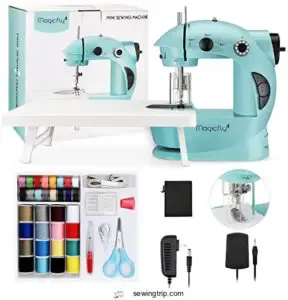
The Bernette 35 Swiss Design Sewing Machine combines dependability with ease, making it a great pick for beginners who want a sturdy machine without the complexity.
With 23 stitch options and seven presser feet, it offers plenty of variety for most sewing projects.
Adjusting settings is simple, thanks to the three user-friendly knobs that control stitch width, length, and patterns.
You’ll love the automatic one-step buttonhole feature, which takes the hassle out of creating professional-looking buttonholes.
A built-in thread cutter and storage compartment keep your workspace neat and functional.
Designed for versatility, this machine handles delicate fabrics like silk as well as sturdier materials like denim with consistent results.
Lightweight and easy to move, it’s a solid partner for creative sewing, delivering reliable performance with every use.
Best For: Beginners and intermediate users looking for a reliable, mechanical sewing machine with versatile stitch options.
- Lacks computerized features for advanced sewing.
- Not as portable as some mini or compact models.
- Adjustments might feel basic compared to digital machines.
- 23 stitch options and automatic one-step buttonhole for versatility.
- Handles both delicate and sturdy fabrics with consistent results.
- Lightweight design with easy-to-use controls.
5. Panasonic Cordless Multi-Directional Steam Iron
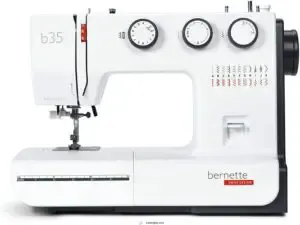
The Panasonic Cordless Multi-Directional Steam Iron is a handy tool that pairs perfectly with your sewing machine.
Its cordless design gives you freedom to move, avoiding the hassle of tangled cords, while the 360° multi-directional soleplate glides effortlessly over fabric.
Whether you’re pressing seams or smoothing out stubborn wrinkles, this iron handles it all with precision.
It has adjustable steam settings, making it suitable for delicate fabrics like silk or heavier materials like denim.
The spray mist feature tackles challenging creases, while its lightweight build keeps your hands comfortable during extended use.
Quilters, in particular, will love its maneuverability for large projects.
Once you’ve finished, it’s compact and easy to store, giving you professional-quality results without the bulk.
Best For: Quilters, crafters, and anyone seeking precise, hassle-free ironing with cordless convenience.
- Cordless design allows free movement without snags.
- Adjustable steam settings suit various fabric types.
- Lightweight and ergonomic for comfortable extended use.
- Requires reheating in its base during long sessions.
- Limited water tank capacity may need frequent refills.
- Not ideal for those who prefer continuous heavy steam.
Key Features of Easy to Use Sewing Machines
When you’re starting out with sewing, choosing a machine with the right features can make all the difference.
Look for options like automatic buttonholes, adjustable stitch settings, and a jam-resistant bobbin system to simplify your projects and avoid frustration.
Automatic Buttonhole Maker
An automatic buttonhole function lets you create perfect buttonholes with minimal effort.
You’ll appreciate its precision and time-saving design.
Features include:
- Multiple buttonhole styles for various projects
- Automation benefits for speed and ease
- Simple adjustments for button size and fabric thickness
- Reliable foot compatibility guarantees smooth sewing
Beginner sewing machines with this feature are both practical and user-friendly.
The best machines also include adjustable stitch length for different tasks.
Extension Table
An extension table is a lifesaver for smoother sewing.
It boosts Table Stability and adds Surface Area, perfect for quilting or larger projects.
Check its Material Quality and Attachment Method to confirm compatibility with your beginner sewing machine.
Plus, many offer clever Storage Solutions!
Here’s a comparison:
| Feature | Benefit | Tip |
|---|---|---|
| Table Stability | Prevents machine wobbles | Choose sturdy materials |
| Surface Area | Expands workspace | Ideal for quilting |
| Attachment Method | Easy setup | Confirm it fits your machine |
Adjustable Stitch Length and Width
Beyond your extension table, you’ll need precise control for different projects.
Adjustable stitch length and width transforms your sewing experience with remarkable flexibility.
Your beginner sewing machine becomes more versatile with this feature, letting you:
- Create stronger seams for heavy fabrics
- Craft delicate stitches for silky materials
- Design decorative elements with wider settings
- Confirm proper thread tension for clean results
- Match stitch types to specific fabric needs
It’s like having custom settings for every project, which provides remarkable flexibility.
Jam-Resistant Bobbin System
While adjustable stitches give you creative control, a jam-resistant bobbin system delivers frustration-free sewing sessions.
These clever systems prevent thread tangles that can halt your progress mid-project.
Drop-in bobbins are especially beginner-friendly, loading easily from the top with a clear cover so you can monitor thread levels.
Quality thread and proper tension settings further reduce jamming issues, keeping your sewing machine running smoothly without interruption, which is crucial for frustration-free sewing sessions.
Benefits and Uses of Easy to Use Sewing Machines
You’ll save money on clothing repairs and discover creative possibilities with an easy-to-use sewing machine that simplifies both essential mending and personal projects.
These beginner-friendly machines also provide a practical skill you can rely on for everything from hemming pants to creating unique handmade gifts.
Fixing Ripped Clothes and Saving Money
You’ll patch up your wallet along with those torn jeans using an affordable sewing machine for beginners.
Simple mending techniques on a beginner-friendly machine can save hundreds annually.
Beginner sewists can master basic fabric selection and alteration projects with minimal practice.
Your investment in a budget-friendly sewing machine pays for itself through cost savings on clothing repairs, turning worn items into like-new condition without expensive tailor visits.
Sewing your own clothes can be more economical, especially if you thrift for fabric, and allows for cost savings.
Creating Unique Items and Relaxing Hobby
While fixing clothes saves money, sewing machines reveal your creative potential too.
With a simple sewing machine, you’ll discover stress relief as you transform fabrics into personalized gifts and textile art.
Your beginner sewing machine makes easy threading a breeze, letting you focus on expression rather than frustration.
Many beginner sewists find joy in:
- Creating upcycling projects that give old materials new life
- Designing custom home décor that perfectly matches your space
Practical Skill for Various Situations
Mastering a sewing machine frequently proves invaluable in everyday life.
You’ll easily handle mending clothes, create simple home decor, or tackle craft projects with confidence.
User-friendly sewing machines make alterations and upcycling fabrics accessible even for beginners.
This practical skill saves money on repairs and opens creative possibilities—whether you’re hemming pants, making cushion covers, or transforming old fabrics into something new and useful.
Choosing The Right Sewing Machine for Your Needs
You’ll need to match your sewing machine to both your project needs and your skill level, considering factors like stitch options, automatic features, and your budget.
The right machine will grow with you as your skills improve, making the difference between frustrating beginner attempts and satisfying finished projects.
Purpose and Complexity of Projects
Regularly matching your sewing machine to your project’s complexity guarantees success for beginners.
When choosing a user-friendly sewing machine, consider what you’ll actually make.
- Simple repairs need basic mechanical models
- Quilting projects benefit from extended work spaces
- Denim and heavy fabrics require strong motors
- Decorative work demands varied stitch options
- Frequent use justifies investing in durability
Your skill level and intended outcomes determine which features matter most, ensuring complete control over your projects.
Pricing and Brand Reliability
After comparing project needs, your next step is weighing cost against quality.
The sewing machine market offers reliable options across price points:
- Brother CS7000X ($199-249): Best beginner value with 10-year warranty and proven reliability
- Singer Heavy Duty 4423 ($149-179): Budget-friendly with solid brand reputation
- Janome Sewist 721 ($299-349): Higher investment but exceptional resale value
The sweet spot for a quality beginner sewing machine is typically $150-250, balancing essential features with budget considerations.
Additional Features and Accessories
When choosing your perfect sewing machine, look beyond the basics to the extras that’ll transform your sewing experience.
Smart accessories make all the difference for beginners.
A clean machine promotes happy sewing, so remember to maintain it well. Maintenance and cleaning are vital for longevity.
| Feature | Benefit | Importance |
|---|---|---|
| Automatic needle threader | Saves eyestrain | Essential |
| Drop-in bobbin system | Prevents jamming | Must-have |
| Extension table | Supports larger projects | Helpful |
Don’t overlook presser feet variety, built-in thread cutters, and convenient needle storage. A good bobbin winder is worth its weight in gold—trust me, you’ll thank yourself later!
Frequently Asked Questions (FAQs)
What is the easiest sewing machine to operate?
Like a walk in the park, Brother CS7000X and Brother XM2701 are your easiest options.
Mechanical machines have fewer parts to break, while computerized ones automatically adjust tension for you, making computerized ones a convenient choice.
Which sewing machine has the least problems?
Mechanical sewing machines like the Brother XM2701 and Janome 2212 have fewer problems due to simpler designs with fewer parts to break.
You’ll find they’re more reliable and easier to maintain yourself.
How much should I pay for a decent sewing machine?
For a decent sewing machine, you’ll want to budget between $150-$
You can find reliable beginner models like the Brother CS6000i or Singer Heavy Duty 4423 in this range with essential features you’ll need.
What is the easiest thing to sew as a beginner?
You’ll find pillowcases, simple tote bags, or straight-line placemats perfect for your first project. They require basic stitches, minimal cutting, and you’ll enjoy a finished product quickly without frustration.
Which sewing machine is best for beginners?
For beginners, the Brother CS6000i is your best bet.
It’s lightweight with automatic needle threading, 60 built-in stitches, and buttonhole features.
The Brother ST371HD and Singer Making the Cut are excellent alternatives too.
What can I do with a sewing machine if I’m a beginner?
You can start with simple projects like pillowcases, tote bags, or mending clothes. You’ll learn basic stitches, hemming, and seam techniques while developing confidence with your machine’s features and settings.
Are mechanical sewing machines good for beginners?
Looking for simplicity in your sewing journey?
Yes, mechanical sewing machines are excellent for beginners.
They’re more durable, have fewer parts to break, and you’ll learn tension control through manual adjustments.
Are computerised sewing machines good for beginners?
Computerized sewing machines offer great benefits for beginners with automatic tension adjustment and pre-programmed stitches.
You’ll appreciate the user-friendly features, though they’re pricier and have more parts that could potentially break, which relates to the overall usability and maintenance of the machine.
What makes a good sewing machine?
Like a loyal companion on your crafting journey, a good sewing machine offers reliable stitching, user-friendly controls, and features that match your needs.
You’ll want durability and proper tension adjustment too.
What fabrics work best with beginner machines?
Cotton, cotton blends, and lightweight wovens work best with your beginner machine.
You’ll find these fabrics feed smoothly through the machine without stretching or slipping, making your first projects more successful.
Conclusion
Ironically, the perfect sewing machine won’t actually sew your projects for you.
Yet finding the best easy to use sewing machines will make your crafting journey substantially smoother.
Whether you’re mending torn jeans or creating custom home décor, models like the Singer M1000 and Janome MOD 50 offer the right balance of simplicity and capability.
Remember, the machine that’s easiest to thread, adjust, and maintain is the one you’ll actually use, and your future creative self will thank you.
- https://www.sewcanshe.com/blog/hem-pants-with-a-sewing-machine
- https://www.singer.com/collections/beginner-sewing-machines?srsltid=AfmBOopnOW8nbc_wcQMK8Xw-8SyNteFy2xKDihT_rj7_vcFfatkdqeU6
- https://www.quora.com/What-is-the-best-type-of-sewing-machine-for-a-beginner
- https://www.reddit.com/r/SewingForBeginners/comments/18s4yss/what_is_the_best_sewing_machine_for_a_total/
- https://www.nytimes.com/wirecutter/reviews/best-sewing-machine/

